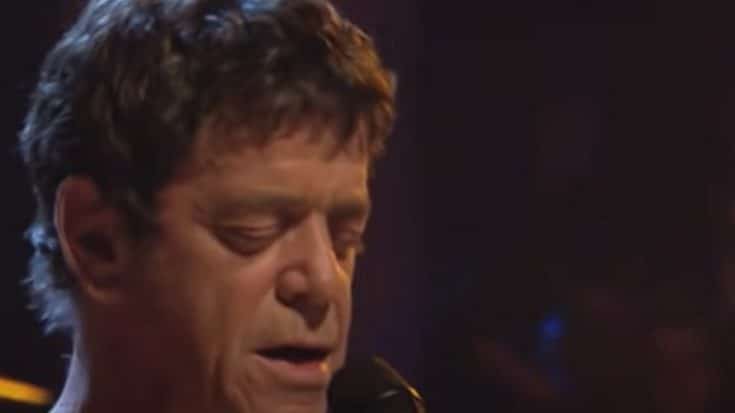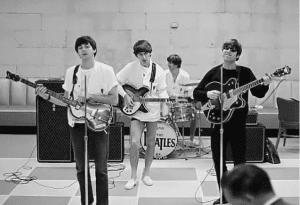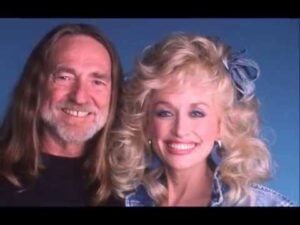10 Insane Stories From Lou Reed’s Career

via BBC / Youtube
Lou Reed, the enigmatic artist who breathed life into the Velvet Underground and carved a path as a solo icon, passed away in 2013. Yet, simply calling him a legend feels like an understatement.
Reed wasn’t just a musician; he was a walking provocation, a New York embodiment of artistic grit. His music pushed boundaries, his lyrics explored the city’s underbelly, and his persona was a confounding mix of cool detachment and raw vulnerability.
But Lou Reed’s life wasn’t just about the music. Oh no, behind the scenes existed a whirlwind of wild stories that solidified his place as one of rock and roll’s most fascinating figures.
Get ready to delve into the bizarre, the unexpected, and the downright insane from the life of Lou Reed.
10. He once had an unlikely, and decidedly uncool, day job
Following the dissolution of the Velvet Underground, Reed found himself at a career crossroads. Unlike most aspiring musicians who toil in pre-fame service jobs, Reed wasn’t a teenager slinging burgers.
At 28 years old, he opted for a more practical route, landing a job as a typist at his father’s tax accounting firm. While a far cry from the rock and roll lifestyle, the position offered a steady paycheck, reportedly around $40 a week. This unique career detour lasted about a year before Reed’s solo music career took off.
9. He liked tai chi so much that he lent his voice to some of its instructional videos
Beyond the dark and edgy persona, Reed harbored a surprising passion for the ancient Chinese practice of tai chi. He began studying the martial art in the 1980s, and it quickly became a lifelong pursuit. This dedication extended beyond personal practice that he even lent his voice to a series of instructional tai chi videos.
Perhaps the most touching testament to this passion comes from his widow, Laurie Anderson. In her obituary for Reed, she revealed a poignant detail: Lou Reed passed away in 2013 while performing the famous 21-form tai chi sequence, his “musician hands moving through the air” in a final, peaceful gesture.
8. He’s not a fan of homeless people, despite singing and raising awareness about it
Reed’s music painted a vivid picture of New York’s underbelly, with songs exploring homelessness, addiction, and the struggles of those on the margins. However, a real-life encounter documented in Anthony DeCurtis’ biography, Lou Reed: A Life, suggests a more complex relationship between the artist and the subjects of his music.
Biographer Rob Bowman recounts an incident where he and Reed were using an ATM in New York City. Reed reportedly became irate at the presence of a homeless man in the vestibule, going so far as to call the bank manager and demand his removal.
Bowman describes the man as unthreatening, simply having an unpleasant odor. This incident casts a shadow on the presumed empathy in Reed’s music, leaving one to wonder about the disconnect between his art and his actions.
7. He modeled for a Honda scooter ad
Reed’s music is synonymous with gritty New York City realism, exploring themes like drug use, social alienation, and the city’s underground scene. It might come as a surprise then, to learn that Reed also appeared in a television commercial for Honda scooters in 1985.
The ad itself is a stark contrast to Reed’s usual persona. Far from the dark and brooding image, the commercial features a seemingly nonchalant Reed cruising the streets on a red scooter. The commercial concludes with a deadpan delivery from Reed himself: “Hey, don’t settle for walkin’.”
6. He hated interviews so much that he lied whenever journalists talked to him
Reed wasn’t a huge fan of interviews. In fact, according to some accounts, his friend Andy Warhol once advised him he didn’t have to be truthful with journalists. Taking this to heart, Reed reveled in creating elaborate stories, contradicting himself in later interviews, and generally keeping reporters at bay with a healthy dose of mockery.
This penchant for fabrication extended to his early solo career. When asked to provide ten facts about himself for his first album with RCA, Reed delivered a list filled with cryptic phrases like “exile and great pondering” and “lawsuits and depression.”
He even threw in a whopper about being expelled from ROTC for threatening an officer with a gun. Years later, Reed admitted to the Los Angeles Times that these fabrications came back to bite him, with bewildered journalists still asking him about his supposed Harvard music degree and rifle-toting escapades.
5. He probably punched David Bowie
Following a Lou Reed concert at London’s Hammersmith Odeon in 1979, the evening appeared to take a friendly turn. Reed discussed his upcoming album with David Bowie and even proposed collaboration, with Bowie supposedly agreeing to produce it on one condition: sobriety.
This alleged condition reportedly set Reed off. Accounts claim he launched into a rage, throwing punches and landing a hit on Bowie’s face. However, the story gets stranger. Reed’s guitarist described the incident as escalating further back at the hotel, with Bowie even confronting Reed in the hallway.
Despite the drama, the situation eventually fizzled out, with Reed nowhere to be found and Bowie left shouting into the night.
4. He moved back to his parents after Velvet Underground disbanded
Lou Reed and his bandmates, John Cale, Sterling Morrison, Angus MacLise (later replaced by Moe Tucker), formed the Velvet Underground in 1964. Managed by Andy Warhol, the band found a home at his New York City studio, The Factory.
With Nico adding vocals, the Velvet Underground released critically acclaimed albums despite struggling commercially. Their music redefined rock and roll, pushing boundaries with its raw energy and lyrics that explored the darker corners of urban life.
The Velvet Underground’s image embodied the epitome of New York cool – all black clothing, gritty musical landscapes, and a connection to the city’s vibrant downtown art scene. However, this image had its humorous contradictions. Following the band’s break up in the early 70s, Reed – the very picture of downtown cool – found himself back home living with his parents in suburban Freeport, Long Island.
3. He got fired after belching on air during a serious PSA
Reed wasn’t always the iconic frontman we know. After graduating high school, he enrolled at Syracuse University, exploring journalism, film, and creative writing. This period also saw him venturing into radio, hosting a jazz show called Excursions on a Wobbly Rail, a name inspired by a Cecil Taylor song.
However, his radio career might have ended abruptly thanks to an infamous (or perhaps apocryphal) incident. According to some accounts, Reed’s on-air antics got him fired after he belched during a public service announcement for muscular dystrophy.
2. He wrote a novelty song and tried inventing a dance craze
Reed’s musical journey began in the early 1960s, not with underground rock anthems, but with novelty tunes. Working for Pickwick Records, he churned out budget-friendly music for supermarkets and drugstores.
In this period, Reed penned a song called “The Ostrich” – a playful jab at the dance craze “The Twist”. While the song’s success as a dancefloor hit remains a mystery, it serves as an interesting footnote in Reed’s career. It was also during this time, recording under the name The Primitives, that he met John Cale, a pivotal meeting that would plant the seeds for the legendary Velvet Underground.
1. He underwent electroshock therapy to cure an illness
Lou Reed’s sexuality was a topic of much discussion throughout his life. He openly sang about New York’s LGBTQ+ community and had at least one long-term relationship with a transgender person. However, he also married three times and had relationships with women. This fluidity led to rumors about his sexual orientation.
These rumors reportedly caused his parents significant confusion. Some sources claim they attempted to “cure” him through electroshock therapy. However, Reed’s sister disputes this, stating it was a response to a nervous breakdown and not his sexuality. Regardless, the experience with electroshock therapy is said to have deeply impacted him, possibly influencing his darker creative work.
https://twitter.com/BillPourquoimec/status/1731937346860228858











